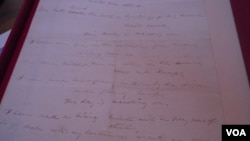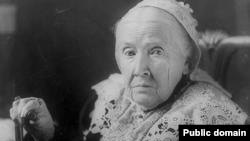"The Battle Hymn of the Republic," originally written as a Civil War anthem, was President Abraham Lincoln’s favorite, according to historians.
The appeal of the hymn continues today. The original manuscript of the song's lyrics will be sold at auction in New York next month and is expected to fetch between $250,000 and $350,000.
Inspiration at twilight
In the early morning hours of Nov. 19, 1861, poet and anti-slavery activist Julia Ward Howe woke up from a powerful dream and quickly scribbled down some words.
Those verses, written during the early years of the Civil War at the Willard hotel in Washington, D.C., were inspired by a skirmish between Union and Confederate soldiers she'd witnessed just hours earlier.
The previous day, she and her husband, Samuel Gridley Howe, also met President Abraham Lincoln at the White House. In her memoir, published in 1899, Howe wrote of being struck by "the sad expression of Mr. Lincoln’s deep, blue eyes."
In the carriage on the way back to the hotel, which is located near the White House and only a few miles from the Confederate advance posts, she and a few members of her party started singing snatches of popular army songs, including the rousing folk tune, "John Brown’s Body," about the famed abolitionist John Brown.
Her friend, Rev. James Freeman Clarke, suggested she write new words to the song, which had become popular in the Union Army during the Civil War.
And Howe did just that.
Lincoln's favorite
Howe’s visions of "Lincoln and battles and marching troops" resulted in "this rather remarkable series of verses," says Chris Coover, senior specialist in American historical documents at Christie's auction house in New York.
With the verses set to the tune of "John Brown’s Body," it quickly became a resounding success with the Union soldiers, and even President Lincoln himself.
"Lincoln loved this piece and asked for it to be performed on many occasions," Coover says.
Lasting legacy
Since the Civil War, the hymn has become an iconic anthem, part of the traditional choir repertoire, and a standard at major political events.
Martin Luther King, Jr. quoted parts of the hymn in several of his speeches, including his rousing 1968 address in Memphis, Tennessee, delivered the night before his assassination. King’s last spoken words at a public event were taken from the hymn's first verse.
"Mine eyes have seen the glory of the coming of the Lord."
Words that carried deep emotional impact more than a century after they were first written, and which continue to resonate in the American consciousness today.











